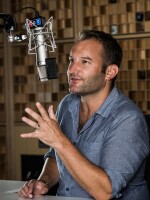Two old enemies -- Russia and NATO -- suggested recently that they're ready to be teammates. Laid out at last weekend's NATO summit in Portugal, the partnership would involve a greater role for Russia in the U.S.-NATO war in Afghanistan. But many Russians have painful memories of the past Soviet experience in Afghanistan, and they're wary of history repeating itself.
Symbolizing the mingling of Russian and Western interests is Moscow's bustling Pushkin Square, named for the famous author and home of the nation's first McDonald's restaurant. The downtown square is also a favorite lunch spot for Fyodor Lukyanov, editor of the journal Russia in Global Affairs and a close watcher of the Russia-NATO discussions.

Lukyanov says Russia has realized a new shared interest: making sure Afghanistan is stable after the war. "Because Russia claims so many times this sphere of privileged interest, now it will be completely destructive for our image if we say, 'No, we don't have to deal with it,' " he says.
It's not just about image. Moscow has grown increasingly alarmed, watching drugs and extremism spill from Afghanistan into former Soviet republics of central Asia. It just began to make sense that Russia should coordinate with NATO to stabilize the region.
But it's an incredibly unpopular idea among Russians, who remember when 15,000 Soviet fighters were killed in Afghanistan in the 1980s, often fighting American-funded mujahedeen. Lukyanov has written about Russia being NATO's partner today, and readers have responded with vicious comments -- and, he says, very little sympathy.
"Comments were that Americans should blame themselves. Let them fail completely; Russia should not help them," Lukyanov says.
When the U.S. went into Afghanistan after the attacks of Sept. 11, 2001, the Kremlin ruled out sending ground troops to help. And Russia has complained about the U.S. and NATO using an air base in the former Soviet republic of Kyrgyzstan. But last week, Russian President Dmitry Medvedev vowed to open more transportation routes for NATO across Russia. Those supply lines could be vital, as NATO convoys have been attacked in Pakistan.
Another area drawing Russia and NATO closer is the fight against drugs. Some 30,000 Russians die each year from drug use. Usually the killer is Afghan heroin.
Viktor Ivanov is Russia's top anti-narcotics official, and he's close to Prime Minister Vladimir Putin. Ivanov is one of the voices in the government calling for a larger Russian role in shaping Afghanistan's future. Instability there, he says, is sending the region into a spiral.
"We've seen this develop in Kyrgyzstan and Tajikistan," he says. "We've seen opposition movements and extremists. They're controlling the flow of heroin. They're getting money from it. And that only helps them expand their activities."

Last month, Ivanov sent several Russian agents onto Afghan soil to help U.S. and NATO forces shut down four drug labs. Initially, at least, Afghan President Hamid Karzai was furious that he wasn't warned that a non-NATO country was involved in an operation within Afghanistan's borders. Yet Russia is talking about more drug raids. It's also offering to train Afghan helicopter pilots. There's no talk of military units. Even the smallest involvement worries many Russians, given the history.
In 1989, the final Soviet troops withdrew from an embarrassing war in Afghanistan that was seen as a waste of lives and money. To some Russians, NATO's war is just a sequel: Afghanistan again proving impossible for foreign invaders.
Ruslan Aushev is a former Soviet and Russian general who was in Afghanistan and now leads an organization helping veterans. That joint raid last month may have involved only a couple of drug agents, but Aushev says it crossed the line and risks damaging Russia's image.
"Even if it's one Russian soldier, to an Afghan population that has no means of communication, maybe it's a force of a hundred thousand," he says. "All the bad memories will come back. In remote villages there will be rumors: 'Soviet soldiers are back in Afghanistan.' "
That, he says, will play into the hands of the Taliban. They'll get to vilify another foreign invader -- a familiar one.
Copyright 2022 NPR. To see more, visit https://www.npr.org. 9(MDAzMjM2NDYzMDEyMzc1Njk5NjAxNzY3OQ001))







